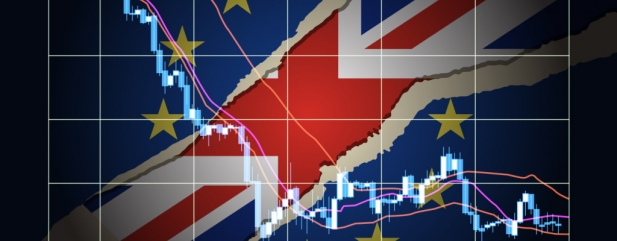Archived article
Please note that tax, investment, pension and ISA rules can change and the information and any views contained in this article may now be inaccurate.
What the latest Brexit news means for markets and investors

Having seemingly out-manoeuvred her Brexiteer colleagues with agreement on a ‘soft Brexit’ approach at Chequers last Friday (6 Jul), prime minister Theresa May is now reeling from the resignation of her Brexit secretary David Davis and foreign secretary Boris Johnson in the space of 24 hours.
The latter news is having the greater market impact which is unsurprising. It was arguably the decision of Boris Johnson to back Brexit which first led the markets to take seriously the prospect of the UK exiting Europe back in February 2016.
Johnson’s latest move, which some expect to presage a leadership challenge, led to a big fall in the value of the pound. There now seem to be three likely scenarios as Brexit negotiations with the EU reach their crunch point ahead of the UK’s scheduled departure in March 2019.
1. Theresa May hangs on and gets a version of her Chequers agreement through the UK parliament
This scenario would almost certainly be positive for sterling and the more domestic-focused mid cap FTSE 250 index. It might also increase the chances of an interest rate hike soon. Currency movements could act as a drag on the FTSE 100.
Investment bank UBS rates this as the most likely outcome. ‘The prime minister seems to have broken the deadlock at home with the cabinet agreement on the direction of Brexit. It hasn’t been cost free as two cabinet ministers have resigned from government.
‘Speculation around further resignations and the potential for a leadership challenge will no doubt ensue. Our expectation is that the prime minister will survive this and push ahead with her vision for Brexit.’
2. May is unseated by Boris Johnson or another candidate who pursues a hard Brexit approach
This should see the pound fall, at least in the short-term, as it would increase the chances of a ‘no-deal’ Brexit. This might ultimately be positive for the FTSE 100 given its inverse correlation to sterling and the international nature of its constituents.
The challenge for Johnson or A.N. Other is there does not appear to be sufficient support in Parliament for a ‘hard Brexit’.
3. The political turmoil leads to a general election even a second referendum on EU membership
Theresa May has warned that divided cabinets lose elections, raising the prospect of Jeremy Corbyn’s Labour Party taking office. The left-wing agenda of such a government would be expected to create fear in the markets.
A second referendum which saw voters agree to reverse Brexit might be positive for the economy in the short-term but would likely raise as many questions as it would answers. (TS)
Important information:
These articles are provided by Shares magazine which is published by AJ Bell Media, a part of AJ Bell. Shares is not written by AJ Bell.
Shares is provided for your general information and use and is not a personal recommendation to invest. It is not intended to be relied upon by you in making or not making any investment decisions. The investments referred to in these articles will not be suitable for all investors. If in doubt please seek appropriate independent financial advice.
Investors acting on the information in these articles do so at their own risk and AJ Bell Media and its staff do not accept liability for losses suffered by investors as a result of their investment decisions.
Issue contents
Big News
- Stocks super charged by electric vehicle plans
- TalkTalk buyout rumours emerge as chairman ups stake close to 30%
- What the latest Brexit news means for markets and investors
- Echostar walks away but Inmarsat still in play, say analysts
- Sunny weather and England’s top World Cup performance hits holiday bookings

 magazine
magazine








